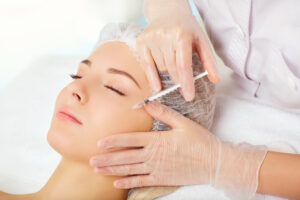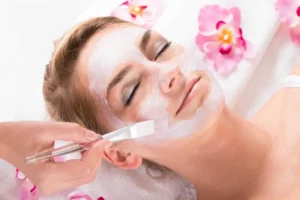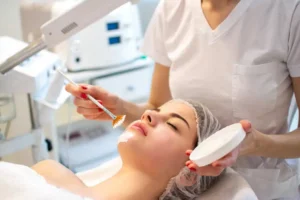Table of Contents
Just because you can buy some excellent skin care products doesn’t mean your skin will now be better. Skincare products work best when applied in the sequence suggested. Your routine will change depending on the time of day, skin type, products, ingredients, and formulations used. You should apply products in descending order of thickness, as thinner ones won’t work through thicker ones.
But you have some questions before you can start a proper skincare routine. Is it necessary to use so many different types of skin care products? Are you wondering what moisturizers you find most effective for your skin? In what order should these be used? To what end are these products being sold? Here, we’ll go over the fundamentals so you can begin crafting a skin care regimen that works for you.
Basics Of A Proper Skincare Routine
Everyone should build a skincare routine involving cleansing, toning, and moisturizing regardless of skin type.
Your skincare routine should target specific concerns or issues to achieve optimal results. Keeping up with your grooming rituals is a great way to reflect on your own development. As your skin’s needs alter over time, so should the products you use.
Any worthwhile skincare routine is worth the time and effort it takes to achieve its desired results. Even with the best skincare products, you shouldn’t expect overnight success. The true effectiveness of a new routine won’t become apparent for at least three to four months, but you should start to see results within six to twelve weeks of consistent, daily practice.
Building A Proper Skincare Routine
Having great skin is not just a product of genetics; your lifestyle choices also play a significant role in how you look in the mirror. However, the best way to moisturize and protect yourself from UV rays is met with various opinions, depending on whether you read product reviews or consult with doctors. It’s up to you to determine how well you treat your skin. As you sort through all the noise, here are some things to remember.
1.) Start With Cleansers
Removal of the oil and dirt that can clog pores and make skin look dull is the primary purpose of facial cleansing. But don’t go overboard with it. The ideal cleanser does not strip the skin of its natural oils but leaves it feeling fresh and clean. Scrubs that exfoliate the skin should only be used once a week, and you should avoid using any product that contains abrasive ingredients like crushed walnut shells.
Over-cleansing or using a cleanser that is too harsh can remove the skin’s natural protective barrier. If you have dry or sensitive skin, you may want to skip washing your face in the morning and instead give it a quick rinse under running water.
2.) Toner
Toners are water-based skin care liquids applied after cleansing the face with your fingers, a cotton ball, or a washcloth, but before other leave-on skincare treatments such as serums and moisturizers. An effective toner can also serve as the last step in your cleansing routine, clearing away any lingering dirt and grime while infusing your skin with more good stuff.
Toner isn’t required, but it can be helpful for refreshing tired skin, removing any lingering debris, and restoring a normal pH. On top of that, modern toners are miles ahead of their drying alcohol- and astringent-based ancestors and are packed with skin-boosting benefits that can leave you looking radiant.
3.) Serums
From wrinkles to age spots, there’s a serum for that, and if you have more than one issue, you can even use different serums for each. The labels on your serums should tell you whether you should apply them in the morning or at night.
In this case, a universal serum would be the best option. Free radicals can be prevented with this anti-aging antioxidant serum. Vitamin C is the most well-known antioxidant because it is present in all high-quality serums. Inadequate amounts of vitamin C damage our skin irreparably, while adequate amounts can reverse many of the harmful effects of the sun and pollution. Many people with darker skin tones struggle with hyperpigmentation; however, a daily application of vitamin C serum can help diminish the look of dark spots.
4.) Moisturizing
A moisturizer’s primary function is to hydrate and calm the skin. Moisturizers help prevent water loss through the skin’s outer layers and boost the skin’s natural protective oils and lipids like ceramides. No matter your skin type, a suitable moisturizer is always a good idea.
The skin loses its hydration barrier as a natural part of the aging process, and regular washing further depletes the surface’s natural hydrators.
If your skin is oily or prone to acne, and you want to wear makeup during the day, choose a lighter lotion or gel that will soak in quickly and not pill under makeup. If your skin is dry, use a cream instead of a lotion. Dermatologists recommend using a moisturizer year-round, regardless of skin type, to keep skin looking young and healthy.
Ceramides and hyaluronic acid, for example, are the building blocks of a hydrating skincare routine.
5.) Sunscreen
One of the most important aspects of skincare for people of all ages and skin types is avoiding sun damage. If you don’t use sunscreen to protect yourself from the sun, nothing else you do will matter. The sun’s rays are the primary reason for skin aging before its time, and their effects extend far beyond appearance.
The risk of developing skin cancer is raised when one spends time in the sun without proper protection. Using an SPF every day in addition to a hyperpigmentation treatment is like taking two steps forward and one step backward.
Putting on a broad-spectrum sunscreen with an SPF of 30 or higher on your face, neck, and the backs of your hands should be the last step of your morning skincare routine, and you should do this at least 30 minutes before going outside. If you’re trying to reduce the number of products you use daily, using a daily moisturizer with SPF instead of applying a moisturizer and SPF separately can be helpful.
Takeaway
The process of building a proper skincare routine takes trial and error on your part. Finding which products work well for your skin type would be best. However, that may take too much time and unnecessary expenses, so the best option is to reach out to a skin expert. If you want to know which skincare products and approaches work specifically for your skin, consider contacting and scheduling an appointment with our clinic, Signature Aesthetics & IV Lounge.






